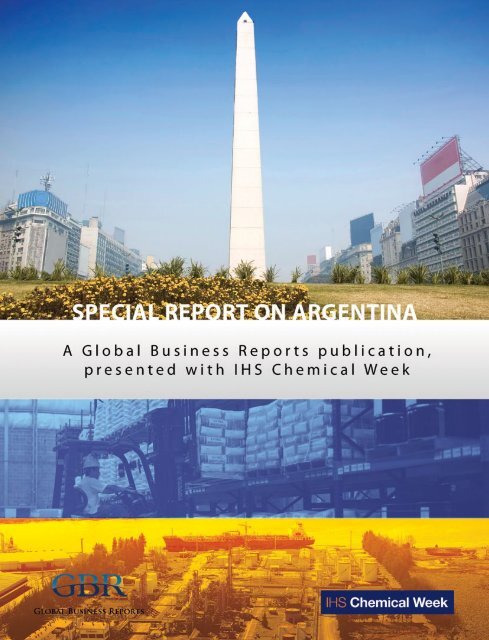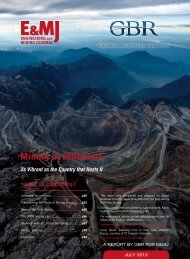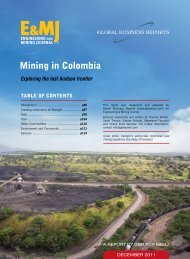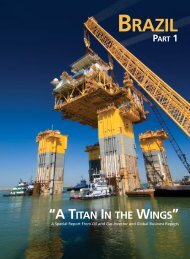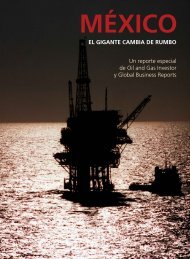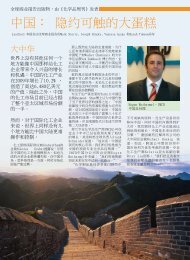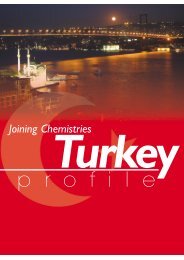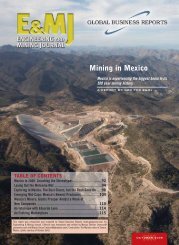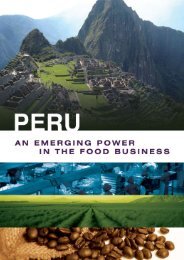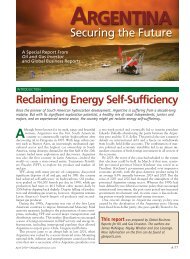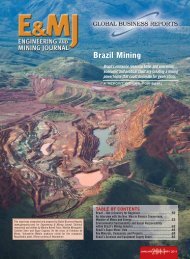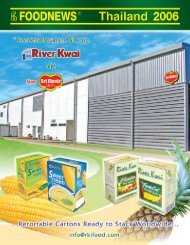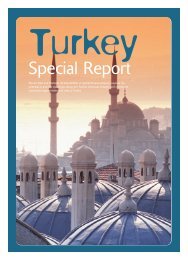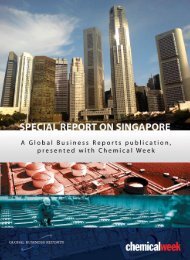Argentina Chemicals 2012 - GBR
Argentina Chemicals 2012 - GBR
Argentina Chemicals 2012 - GBR
Create successful ePaper yourself
Turn your PDF publications into a flip-book with our unique Google optimized e-Paper software.
A Global Business Reports publication, presented with IHS Chemical Week<br />
Argentine <strong>Chemicals</strong> Industry<br />
This research has been conducted by Amanda Lapadat and Vanessa Acuna of Global Business Reports. For more information, contact<br />
info@gbreports.com or follow us on Twitter: @<strong>GBR</strong>eports<br />
Ingenuıty and<br />
adversıty<br />
<strong>Argentina</strong>’s major growth occurred<br />
from the 1880s to early 1900s<br />
exporting livestock and grains,<br />
which brought the rapid economic<br />
expansion to become one of the<br />
wealthiest countries per capita. It has<br />
experienced various reversals since<br />
then, including decades of decline and<br />
the occasional default.<br />
As things stand, <strong>Argentina</strong>’s prospects<br />
are relatively encouraging. Emerging<br />
countries such as <strong>Argentina</strong> are experiencing<br />
growth in spite of the economic<br />
crises occurring in Europe and beyond<br />
thanks mainly to high consumption<br />
levels from growing middle classes and<br />
investors looking to new markets for<br />
growth opportunities that are no longer<br />
as prevalent in mature markets.<br />
Political instability has undoubtedly<br />
been a recurring factor in <strong>Argentina</strong>’s<br />
fight for economic success.<br />
Successive government parties<br />
have favored short-term<br />
objectives in line with election<br />
periods over long-term<br />
economic sustainability.<br />
This has often resulted in<br />
chronic inflation, substantial<br />
foreign debt, economic<br />
stagnation and restrictions<br />
in foreign exchange. Nevertheless,<br />
over the last few<br />
years, <strong>Argentina</strong> has experienced<br />
high economic<br />
growth averaging around a<br />
9% GDP increase in 2010<br />
and 2011.<br />
2<br />
The chemical sector is an integral<br />
part of <strong>Argentina</strong>’s economy, with<br />
above average growth rates in comparison<br />
to other sectors, at 10.5% average<br />
annual growth from 2007 to 2011, making<br />
it the most dynamic sector in the country’s<br />
economy.<br />
In 2010, the sale of chemical<br />
products in <strong>Argentina</strong> totaled $25.4<br />
billion, with the industry exporting<br />
$5.85 billion worth of chemical products<br />
in the same year making it the second<br />
largest market in South America<br />
(see Figure 1). According to data from<br />
<strong>Argentina</strong>’s Chamber of the Chemical<br />
and Petrochemical industries (CIQyP),<br />
basic chemical substances and products<br />
contributed 24.8% of the industry’s<br />
production value, while agrochemicals<br />
contributed 13.0%, specialty chemicals<br />
contributed 15.1% and end-use chemical<br />
products such as pharmaceuticals,<br />
paints and coatings, cosmetics and<br />
hygiene products contributed the remaining<br />
47.1%.<br />
CIQyP recently conducted a study<br />
on the various segments of the chemical<br />
industry and evaluated the overall<br />
growth potential of the market over the<br />
next 10 years. Mr. Jose Maria Fumagalli,<br />
CIQyP’s Executive Director, explains the<br />
Figure 1: Argentine Chemical Industry: Value of production,<br />
Exports, Imports and Trade Balance<br />
In millions of dollars<br />
3000 0<br />
2500 0<br />
2000 0<br />
1500 0<br />
1000 0<br />
5000<br />
0<br />
-5000<br />
-1000 0<br />
Source: CIQyP<br />
findings: “Our forecast shows that the<br />
chemical industry in <strong>Argentina</strong> has<br />
the opportunity to grow 100% over the<br />
next 10 years under ideal growth scenarios.<br />
In general, all chemical producers<br />
have good growth potential in the local<br />
market as the economy is growing at 8%<br />
per year and the demand for chemicals is<br />
increasing.If we look at the petrochemical<br />
sector, we have a limit posed by the<br />
scarcity of raw materials, in particular<br />
natural gas. The Department of Energy in<br />
the US has evaluated the impact of the<br />
potential recovery to have the potential<br />
for 500 years of reserves for the country.The<br />
government is trying to deal with<br />
this matter and there is good growth potential<br />
if we are able to develop the shale<br />
gas resources in our country...in the next<br />
four to five years.”<br />
Despite these seemingly positive<br />
findings from CIQyP, there is an air of<br />
uncertainty and concern that pervades<br />
the industry. While the private players<br />
have built solid foundations and display<br />
impressive innovation and growth,<br />
in line with the rising GDP, a question<br />
mark hangs over the government’s efforts<br />
to provide a competitive business environment.<br />
Several developments over the past<br />
25433, 08634<br />
10263, 05264<br />
5849,303594<br />
-4413,749043<br />
1993 1994 1995 1996 1997 1998 1999 2000 2001 2002 2003 2004 2005 2006 2007 2008 2009 2010<br />
Value of Production Exports Imports Trade balance<br />
year have sparked investor<br />
concerns, such as the<br />
Government’s decision in<br />
April to renationalize YPF<br />
through the expropriation<br />
of 51% of YPF shares from<br />
Spain’s Repsol, underlining<br />
the risk for multinational<br />
companies in the country.<br />
The nationalization not only<br />
brought tension to <strong>Argentina</strong><br />
and Spain’s historic<br />
relations, but also brought<br />
condemnation from the European<br />
parliament and highlighted<br />
the country’s struggle<br />
for raw materials, with
A Global Business Reports publication, presented with IHS Chemical Week<br />
Jose Maria Fumagalli, Executive Director, CIQYP<br />
<strong>Argentina</strong> importing fuel for the first<br />
time in 2010 since YPF was privatized<br />
in the early 1990s and Argentinean President,<br />
Cristina Fernández de Kirchner,<br />
blaming Repsol for the deterioration of<br />
the reserves through lack of investment.<br />
The government’s inflation rates have<br />
come into question, with international<br />
organizations stating <strong>Argentina</strong>’s official<br />
inflation figures between 5% and 11%,<br />
are false and the country’s true inflation<br />
rate is more than double the official<br />
number. Unions throughout the country<br />
have been striking over wages, blocking<br />
access to some major industrial sites.<br />
Finally, in late 2011 and early <strong>2012</strong> the<br />
Argentinean government announced increased<br />
import restrictions, which have<br />
impacted much of the chemical industry.<br />
The new requirements force companies<br />
to obtain licenses to import products<br />
and prior approval from the government<br />
before any shipments are made. In<br />
addition, the government is requiring that<br />
any company importing goods implements<br />
a trade balance, with the same value<br />
of goods exported; a major challenge<br />
for many companies that have never<br />
exported before.<br />
Industrial Plan 2020<br />
The “Strategic Industrial Plan 2020”<br />
(Plan 2020), introduced by Ms.<br />
Fernández in late 2011, outlines<br />
the objectives and federal steps to<br />
be taken to transform the country’s<br />
industrial sector and stimulate growth.<br />
Of the eleven industrial value chains<br />
included in the report, chemicals, petrochemicals<br />
and medicines are segments<br />
highlighted as leaders in the development<br />
of the country.<br />
Plan 2020 is particularly focused<br />
on the need to build a strong domestic<br />
market (annual industrial growth of<br />
5%) and will increase the country’s investment<br />
in industry to 28%, from 24%<br />
of GDP. To achieve this, the government<br />
aims to double the country’s trade<br />
surplus, encourage local production,<br />
bring GDP to $580.7 billion, and reduce<br />
the unemployment rate from 7.3% to 5%<br />
by 2020 through the creation of 1.5 million<br />
jobs. The plan also aims to increase<br />
exports by 49%, from $68.5 billion in<br />
2010 to $136 billion in 2020, while<br />
imports will drop 45%, to $56.4 billion<br />
from $110.4 billion.<br />
The initial framework of this plan<br />
looks promising, but <strong>Argentina</strong> needs a<br />
long-term industrial plan for transforming<br />
growth into development, and the<br />
country’s current supply of raw materials<br />
is too limited to support the full growth<br />
potential being demanded and the drastic<br />
restrictions on imports has stunted<br />
the operations of many local companies<br />
that rely on the import of raw materials<br />
and final goods, and are now forced to<br />
change their business model or cease operations,<br />
which will impact the health of<br />
the country’s economy.<br />
The country’s potential to increase<br />
raw material supply through investment<br />
in the oil and gas industry and the development<br />
of unconventional gas reserves<br />
is promising in the long term, and private<br />
companies’ proven track record for<br />
overcoming difficult economic situations<br />
time and time again thanks to creative<br />
and adaptive thinking from their opportunistic<br />
leaders, virtually guarantees the<br />
continued growth of the Argentinean<br />
chemical industry. Yet the extent of its<br />
growth will be determined by the sensible<br />
implementation of government policies<br />
in support of growth and the nation’s<br />
ability to attract foreign investment.<br />
This report will take a closer look<br />
at the companies and individuals transforming<br />
the Argentinean chemical industry<br />
on the ground and identify this<br />
unique market’s opportunities for foreign<br />
investors to become part of <strong>Argentina</strong>’s<br />
growth story.<br />
3
A Global Business Reports publication, presented with IHS Chemical Week<br />
PETROCHEMICALS<br />
A need for raw materials<br />
The total annual production of the<br />
chemical and petrochemical industry of<br />
<strong>Argentina</strong> is estimated at 8 million Mt<br />
in 2010, with 40% of this made up from<br />
products of basic chemistry, 30% semiproducts<br />
and components, and 30% readymade<br />
materials and finished products,<br />
(according to Instituto Petroquimico<br />
Argentino). From years 2006 to 2011,<br />
domestic consumption of chemical<br />
products grew by 22%, and the export and<br />
import of chemical products, including<br />
basic products and semi- manufactured<br />
products, has increased 25% and 23%<br />
respectively. With these numbers, it is<br />
easy to see the attractions of the industry.<br />
Shortage of raw<br />
materials<br />
<strong>Argentina</strong> has seen a dramatic reduction<br />
of gas reserves in over the last 30 years,<br />
which is now threatening the country’s<br />
once thriving petrochemical industry. In<br />
1980, <strong>Argentina</strong> had 50 years of natural<br />
gas reserves, which after years of little<br />
investment have now decreased to less<br />
than eight years, according to figures from<br />
IPA. Concerning oil, the reserves also are<br />
facing a reduction although not as quickly<br />
as for natural gas. Investment in the<br />
discovery and development of oil reserves<br />
has also been below adequate, as with<br />
gas, over the past three decades, however<br />
with the reduction in oil production over<br />
the last 10 years has helped to mitigate the<br />
drop in reserves, at least for the time being<br />
Petroquimica Cuyo’s General<br />
Manager, Jorge R. Sampietro, states:<br />
“Over recent years, <strong>Argentina</strong>’s natural<br />
gas supply during the winter season<br />
has been insufficient to meet growing<br />
total demand. Therefore, government<br />
authorities have decided to divert the<br />
scarce resources to the residential sector,<br />
rather than to basic industries in order to<br />
satisfy domestic use. This decision has<br />
had a severe impact on the petrochemical<br />
sector and has led to domestic demand<br />
for petrochemicals far outweighing the<br />
diminished local production levels.” The<br />
domestic demand for polypropylene is<br />
currently around 350,000 Mt/y, whilst the<br />
combined local producers output reaches<br />
only 280,000 Mt/y.<br />
Petroquimica Cuyo is the oldest<br />
polypropylene producer of <strong>Argentina</strong><br />
and the second largest producer in terms<br />
of installed capacity. The main source<br />
of basic feedstock (propylene) for its<br />
130,000 Mt/y capacity is the YPF Luján<br />
de Cuyo refinery that is located next to the<br />
company’s industrial plant in the province<br />
of Mendoza.<br />
The company’s strategic location<br />
next to its main supplier, YPF, is ideal<br />
for operations when YPF’s production<br />
levels are maximized, Jorge R. Sampietro,<br />
explains the difficulties Petroquimica<br />
Daytime view of Petroquímica Cuyo’s C3 Splitter,<br />
Lujan de Cuyo, Mendoza, <strong>Argentina</strong>.<br />
Cuyo is facing under the current scenario:<br />
“The inland location of our plant site<br />
constitutes a very difficult problem<br />
to overcome, because it limits our ability<br />
to find new sources of raw materials<br />
due to high transportation costs and<br />
logistical complexities involved.<br />
Therefore, our challenge today is<br />
to improve our performance on a<br />
continuous basis through the reduction of<br />
production costs, the development of new<br />
polypropylene grades to meet the evergrowing<br />
plastics transformers demand and<br />
to improve our technical and commercial<br />
service to our customers.”<br />
When looking to the future, Sampietro<br />
is optimistic. “We are confident that, in<br />
the foreseeable future, YPF will increase<br />
the capacity of its Luján de Cuyo refinery,<br />
thus making available to our company<br />
4
A Global Business Reports publication, presented with IHS Chemical Week<br />
larger amounts of propylene and ethylene<br />
that will, in turn, enable us to build new<br />
and larger polypropylene production<br />
capacity”<br />
Petrobras, an integrated energy<br />
company, and the second largest oil<br />
producer in <strong>Argentina</strong> after YPF, is also the<br />
leading player in the styrene business in<br />
<strong>Argentina</strong>. Petrobras has been established<br />
in <strong>Argentina</strong> since 1993, operating in<br />
oil and gas exploration and production.<br />
Petrobras <strong>Argentina</strong> is the only producer<br />
in the country of styrene monomer,<br />
polystyrene, styrene butadiene synthetic<br />
rubber (SBR) and Bioriented Polystyrene<br />
(BOPS), with two petrochemical facilities<br />
in <strong>Argentina</strong>, in San Lorenzo and Zárate.<br />
The industrial complex located in San<br />
Lorenzo, province of Santa Fe, extends<br />
over and area of 150 hectares with a<br />
pier on the Parana River suitable for<br />
handling liquid cargo and has an installed<br />
capacity of 160,000 Mt of styrene and<br />
58,000 Mt of elastomers (rubber SBR<br />
and NBR). The other facility located in<br />
Zárate produces general purpose and high<br />
impact polystyrenes as well as bioriented<br />
polysterene in the only unit of its kind in<br />
Latin America.<br />
<strong>Argentina</strong> has historically been an oil<br />
exporter, but in recent years the country<br />
has had to turn to imports to meet the<br />
rising internal demand and depleting<br />
reserves. IPA estimates that for 2011 the<br />
petrochemical industry had a trade deficit<br />
of $2.1 billion. President Ms. Fernández<br />
has publically blamed Repsol for the<br />
country’s current situation, accusing it<br />
of having drained YPF of financing since<br />
acquiring a controlling stake in the 1990s<br />
and not investing enough in <strong>Argentina</strong><br />
to secure the country’s long term energy<br />
position. Despite the varying opinions on<br />
who is to blame, it is clear that this lack of<br />
investment has impacted not only the oil<br />
and gas sector in <strong>Argentina</strong>, but also the<br />
downstream activities which make up the<br />
country’s petrochemical market.<br />
On a promising note, <strong>Argentina</strong> has<br />
some of the world’s largest reserves of<br />
shale oil and gas. In November 2011, YPF<br />
announced a major find of one billion<br />
barrels of shale oil, ranking <strong>Argentina</strong><br />
number three in the world in terms of<br />
recoverable shale resources, behind China<br />
and the US, according to BBC News and<br />
US Energy Information Administration.<br />
Through the oil and gas sector, the<br />
downstream petrochemical sector will<br />
likely get a second wind in coming years<br />
if investment presents itself as is expected<br />
by the leaders in the industry. However,<br />
much of the petrochemical market in<br />
<strong>Argentina</strong> has essentially been put on<br />
hold until the government determines a<br />
clear plan for investment with its newly<br />
reacquired YPF, which provides a majority<br />
of the raw materials the petrochemical<br />
industry relies on. Until clear investments<br />
are made, the companies of <strong>Argentina</strong>’s<br />
petrochemical sector are largely in the<br />
dark, without knowing what the future<br />
holds or when their production plants can<br />
once again reach full capacity.<br />
Carboclor is a petrochemical<br />
company that is majority owned by<br />
the state owned Uruguayan company,<br />
ANCAP (Administración Nacional de<br />
5
A Global Business Reports publication, presented with IHS Chemical Week<br />
Mr. Carlos D. de Juana, General Manager<br />
Carboclor<br />
Combustibles Alcohol y Portland), located<br />
in Campana. Carboclor is the leader in the<br />
local market for oxygenated solvents as<br />
they are the only producer in <strong>Argentina</strong>.<br />
Carboclor operates three production lines,<br />
producing oxygenated solvents, aliphatic<br />
and aromatic solvents and MTBE (octane<br />
enhancer), which is used to improve the<br />
quality of gasoline; totaling production of<br />
around 152,000 Mt/y.<br />
Under the current circumstances,<br />
trying to obtain and maintain a normal<br />
level of raw material provision is a<br />
constant challenge for Carboclor. The<br />
company’s General Manager, Carlos D.<br />
de Juana, explains: “The production of<br />
oxygenated solvents is mainly dependent<br />
on the supply of raw materials, which<br />
often results in fluctuating production<br />
levels, and some years producing much<br />
more output than others. Last year,<br />
<strong>Argentina</strong>’s refineries ran at low levels<br />
due to different reasons such as general<br />
maintenance programs, some mechanical<br />
delays, and lack of crude oil receptions,<br />
which impacted the normal delivery of<br />
raw materials for more than 100 days,<br />
reducing Carboclor’s production level.”<br />
To secure the company’s long-term<br />
position, Carboclor is in the process of<br />
building a new alkylation plant that will<br />
produce alkylate (green octane enhancer)<br />
that improves the quality of premium<br />
gasolines. The project will amount<br />
to around $50 million spent over the<br />
next three years and will diversify the<br />
company’s product portfolio. “Our new<br />
alkylate project will change the future of<br />
Carboclor because the lack of premium<br />
gasoline in the local market will bring<br />
many opportunities. Three years from<br />
now the project will be completed and<br />
become a major focus for the company,”<br />
says de Juana.<br />
Adapting to survive<br />
Many operators, like Carboclor, have<br />
become accustomed to only operating their<br />
production facilities at partial capacity or<br />
have had to rely on their creativity to find<br />
raw materials by other means. Dr. Alfredo<br />
G. Friedlander, Executive Director of<br />
‘Instituto Petroquimico Argentino’ (IPA)<br />
says: “The petrochemical companies in<br />
<strong>Argentina</strong> are well integrated and efficient.<br />
<strong>Argentina</strong> has a balanced supply of skilled<br />
labor to support the chemical industry in<br />
comparison to countries like Brazil; we<br />
have the necessary workers to fulfill the<br />
needs of the industry. The only problems<br />
in the industry currently are all related to<br />
external factors. The main issues at the<br />
6
A Global Business Reports publication, presented with IHS Chemical Week<br />
Gerardo D. Waisburg, CEO Grupo Piero<br />
(Petroquimica Rio Tercero)<br />
moment involve the raw materials and the<br />
control of money. Monetary issues usually<br />
involve companies owned by foreign<br />
investors, which have limited flexibility<br />
with their funds. Additionally, due to the<br />
dependency on petrol gas, any reduction in<br />
the production of gas dramatically affects<br />
the entire industry. Since the production<br />
of gas has been reduced in <strong>Argentina</strong> in<br />
the last couple of years, we have become<br />
more reliant on importing necessary raw<br />
materials.”<br />
This means that in the short<br />
term, companies are reliant on their<br />
creativity and resourcefulness to get<br />
them through this shortage, but in the<br />
long term, investments in exploration<br />
and the priorities of both government<br />
and business must change if the<br />
downstream market is to regain its<br />
footing. Dr. Friedlander explains:<br />
“Ideally, companies will either invest<br />
more in exploration for these raw<br />
materials or shift to using different<br />
materials in their production, like<br />
shale gas. There has not been much<br />
of a push for exploration previously<br />
because of the regulated markets in<br />
<strong>Argentina</strong>. This means that companies<br />
do not make much money finding raw<br />
materials and have little incentive to do<br />
so. These alternatives exist, but it will<br />
take some time to modify the habits of<br />
an entire industry.”<br />
Petroquimica Rio Tercero (PRIII)<br />
demonstrates the power of adaptation<br />
in the face of challenges. PRIII has<br />
managed to use technology and<br />
its resourcefulness to combat the<br />
7
A Global Business Reports publication, presented with IHS Chemical Week<br />
shortage of raw materials in <strong>Argentina</strong><br />
for petrochemicals into a reason for<br />
growing the business. PRIII’s main<br />
product TDI is a basic compound for<br />
the manufacturing of polyurethane<br />
foam that is produced by the company<br />
in South America’s only TDI production<br />
facility ever since its major competitor<br />
announced the closure of its TDI plant<br />
in Camacari, Brazil in April <strong>2012</strong>. PRIII’s<br />
plant is located in Cordoba, which is a<br />
high technology and capital-intensive<br />
complex that has an installed capacity<br />
of around 30,000 Mt/y.<br />
In addition to TDI, PRIII has<br />
developed a chemical business<br />
leveraged on the by-products that<br />
are a result of its vertically integrated<br />
production process, which is either<br />
used internally as a raw materials for<br />
products or sold to the domestic market.<br />
President of Grupo Piero, Gerardo D.<br />
Waisburg, explains: “The company’s<br />
chemical business can continue<br />
producing while TDI is shut down<br />
for maintenance as a result of the<br />
installed hydrochloric acid synthesis<br />
plant. This production improvement<br />
is the starting point of the increased<br />
development of PRIII´s chemical<br />
business, not only as a supplier of<br />
raw material for TDI but also as an<br />
independent and separate chemical<br />
business. The chemical business<br />
now accounts for 40% of domestic<br />
revenues.”<br />
PRIII’s industrial complex is one<br />
of the most vertically integrated TDI<br />
production facilities in the world,<br />
composed of six plants that generate<br />
intermediate inputs and other process<br />
chemicals. PRIII is largely focused on<br />
the Mercosur region. “We are constantly<br />
innovating and finding new uses for our<br />
products and by-products, in an effort<br />
to fully utilize every resource of PRIII.<br />
We have a number of exciting projects<br />
in the works that consolidate PRIII<br />
as a major player in the polyurethane<br />
supply chain in Brazil over the next<br />
years,” said Waisburg.<br />
Providing investment in production of<br />
raw materials is forthcoming, prospects<br />
for growth in <strong>Argentina</strong>’s petrochemical<br />
sector look promising. Without an<br />
increase in raw materials, companies<br />
cannot operate at full capacity and sustain<br />
this trend.<br />
AGROCHEMICALS<br />
Feeding the world<br />
Despite fears of stalled growth in<br />
the immediate to short term for the<br />
petrochemical and other chemical<br />
segments, the agrochemical segment<br />
is expected to continue achieving a<br />
strong performance, riding the wave of<br />
<strong>Argentina</strong>’s prominent role in feeding<br />
the world’s growing population.<br />
<strong>Argentina</strong>’s agriculture sector has<br />
excellent technological know-how and<br />
a long history of exporting crops and<br />
livestock. The sector will be a main<br />
source of growth for the country in<br />
the years to come if the government<br />
maintains the right tax incentives for<br />
large farmers that have the capability<br />
to export abroad.<br />
Historically, <strong>Argentina</strong> has<br />
been among the world leaders in<br />
the production and/or export of<br />
agricultural products. <strong>Argentina</strong><br />
produced over 8% of world agricultural<br />
output between 2005-2007, making<br />
<strong>Argentina</strong> the eighth-largest producer<br />
and the twelfth largest exporter of<br />
agricultural commodities in the world<br />
(Food and Agriculture Organization<br />
[FAO]).<br />
A recent report by <strong>Argentina</strong>’s<br />
association for agribusiness, “La Cámara<br />
de Sanidad Agropecuaria y Fertilizantes”<br />
(CASAFE) and KleffmanGroup <strong>Argentina</strong>,<br />
shows that there has been a 22% growth<br />
in annual sales of agrochemicals in the<br />
country in 2011. The agrochemical<br />
sector has shown constant growth in<br />
output over the last decade, reaching<br />
total annual sales of over $2 billion in<br />
2011. The greatest rise in sales volume<br />
was seen in herbicides (58%), from the<br />
country’s strength in the production<br />
of glyphosate, followed by insecticides<br />
(17%) and fungicides (11%). <strong>Argentina</strong>’s<br />
largest exports include soybeans and<br />
derivatives, corn and wheat.<br />
8
A Global Business Reports publication, presented with IHS Chemical Week<br />
Despite the country’s opportunities for growth, there are<br />
some serious concerns. Carlos Danilowicz, General Manager<br />
of Magan, subsidiary of Makhteshim Agan Industries says:<br />
“There are currently several challenges facing companies<br />
operating in the chemical industry here. Firstly, you need<br />
to implement different requirements imposed by local<br />
authorities, such as registrations, and follow policies related<br />
to microeconomics. Secondly, there is now a new government<br />
requirement; if you wish to import any good worth more than<br />
100 Argentine Pesos, you need a special authorization from<br />
the government; a cumbersome process for us which can take<br />
up to a month. The government also requires all companies to<br />
have a trade balance, for every dollar of imported products a<br />
corresponding dollar of exported products must be attained.<br />
To compete in this environment, we try to have a flexible<br />
organization, capable of making faster decisions compared<br />
with other companies. We generally try to be close to the<br />
final users and to the distribution system in order to deliver<br />
what they really need”.<br />
Magan is in the process of expanding its business in<br />
<strong>Argentina</strong>; working on current product lines, investing<br />
money in research, delivering new products to the market and<br />
considering new business opportunities and partnerships<br />
that will strengthen the business.<br />
The government subjects the import of all goods to a preregistration<br />
and pre-approval regime, called the “Declaración<br />
Jurada Anticipada de Importación” since February <strong>2012</strong>, in<br />
addition to product licenses required for hundreds of goods.<br />
The European Union filed a formal challenge to <strong>Argentina</strong>’s<br />
measures in May <strong>2012</strong>, on the grounds that the system is<br />
systematic, non-written and non –transparent. The measures<br />
delay or block goods at the border and inflict major losses<br />
to industry in the EU and arguably to some Argentinean<br />
companies as well.<br />
Chemotecnica is a family owned business that began as<br />
a pharmaceutical company with an agrochemical base and<br />
whose main business is now in crop protection, with its<br />
facility sitting on 14 hectares and housing its own labs for<br />
research and development, formulations and performance<br />
of some synthesis processes. Chemotecnica synthesizes<br />
9
A Global Business Reports publication, presented with IHS Chemical Week<br />
five molecules and has the capacity to<br />
produce 4 million liters of 2,4D amin<br />
or ester and around 8 million liters<br />
of E.C. formulations which are used<br />
partially for Chemotecnica products<br />
and partially for third parties.<br />
Alejandro A. Golfari, Chemotecnica’s<br />
General Manager, discusses his home<br />
market: “<strong>Argentina</strong> is one of the most<br />
competitive [agrochemical markets] in<br />
the world, and between the Mercosur<br />
nations, we will be feeding the world<br />
in the future. <strong>Argentina</strong> is one of the<br />
most efficient places in the world<br />
for agriculture. Despite a tax on our<br />
production, we still have been able to<br />
achieve competitiveness worldwide.<br />
The country does not have the ability to<br />
introduce new hectares to our planting<br />
areas so instead we must increase the<br />
amount produced per hectare, which is<br />
both our challenge and key difference.<br />
The only way for us to achieve this<br />
is by putting more technology into<br />
the seed and investing in crop<br />
protection solutions.”<br />
Recently the company developed<br />
a water-based formulation for<br />
cypermethrin, a more environmentally<br />
friendly formulation without any<br />
solvents that is specially developed<br />
for use in areas with water quality<br />
problems. “This type of new green<br />
chemistry will be the future of crop<br />
protection. We believe in providing<br />
more than just control, the focus should<br />
be on the prevention of disease and this<br />
is in what we are working to develop<br />
for the market,” says Golfari.<br />
Weather is another incalculable<br />
that can buffet the industry. After<br />
<strong>Argentina</strong>’s drought in 2009, which<br />
many says was the worst faced in 100<br />
years, the sector saw another drought<br />
in 2011 which caused the harvest<br />
to fall to $7.7 billion from $9 billion<br />
the year before (Financial Times).<br />
“The agricultural sector is a sensitive<br />
market year to year and at times it<br />
can be difficult to collect payments if<br />
our clients experience a poor year in<br />
production. When there is a drought<br />
like we saw in 2011, there are fewer<br />
crops to sell and the price grows for<br />
the end consumer to cover the farmer’s<br />
costs, although less customers will then<br />
buy. Years ago, when we had a drought<br />
like this one, prices did not change<br />
because the stock levels were very<br />
high, but today the stock is very tight<br />
so prices change quite drastically,” says<br />
Rizobacter President, Ricardo Yapur.<br />
Biotechnology<br />
<strong>Argentina</strong> is one of the biotechnology<br />
leaders in South America, and<br />
over the past decade the export of<br />
biomedicines has grown steadily,<br />
with exports in 2011 totaling more<br />
than US$260 million according to<br />
national government. Biotechnology<br />
will undoubtedly be a major source<br />
of growth, with <strong>Argentina</strong> being one<br />
of the most advanced countries in<br />
the production of transgenic soybean<br />
seeds, corn, sunflower and cotton with<br />
several genes and types of resistance<br />
10
A Global Business Reports publication, presented with IHS Chemical Week<br />
Andres Kocmur, President CKC<br />
to drought, herbicides and insects in<br />
the region.<br />
Rizobacter <strong>Argentina</strong> S.A. is<br />
a national leader in agricultural<br />
microbiology and produces various<br />
agrochemical product lines such as<br />
inoculants, seed therapies, pest control<br />
baits and forage seed coating. Today<br />
one sixth of its sales comes from exports<br />
to markets including the US, Bolivia,<br />
Uruguay, Venezuela, Ecuador, UK, China<br />
and South Africa. The company has<br />
grown as a result of its investment in<br />
research and development and through<br />
the use of strategic alliances. Ricardo<br />
Yapur, Rizobacter President, explains:<br />
“Through these alliances we share<br />
distribution, technology and know-how<br />
to help grow the company into new<br />
markets. There are 18 million hectares<br />
of soya production in <strong>Argentina</strong> and 25<br />
million hectares in Brazil that all use<br />
inoculants treatment”.<br />
Rizobacter is investing 30% of<br />
its annual profits in research and<br />
development to meet their goal of<br />
introducing new inoculants to the<br />
market each year.<br />
<strong>Argentina</strong> is the third largest global<br />
producer of genetically modified<br />
(GM) crops, with 16% of global<br />
GM crops cultivated in the country,<br />
according to government statistics.<br />
“The expectations of Argentinean<br />
agriculture production are incredible<br />
and the new biotechnologies here will<br />
make great increases to the production<br />
by hectare. We have access to the<br />
best technologies in the world for the<br />
agrochemical market and a young,<br />
educated generation that understands<br />
the importance of new technologies,<br />
which will lead our role in the growth<br />
of global food demand and production,”<br />
declares Rizobacter’s President,<br />
Ricardo Yapur.<br />
Crawford Keen and Company is a<br />
family company that began operating<br />
in <strong>Argentina</strong> in 1970. It was one of the<br />
first companies in the Argentinean<br />
market to develop inoculants and today<br />
is known as Laboratorios CKC <strong>Argentina</strong><br />
(CKC). CKC signed an agreement with<br />
the ‘Instituto Nacional de Tecnología<br />
Agropecuaria’ (INTA), to develop new<br />
technologies at the Castelar innovation<br />
park where CKC is the only private<br />
company to date with operations<br />
on-site.<br />
CKC has a biological line of products<br />
called “growth promoters” and five<br />
years ago, CKC launched a bio-fertilizer,<br />
11
A Global Business Reports publication, presented with IHS Chemical Week<br />
which has two growth-promoting<br />
bacteria in the same sterile medium.<br />
This promoter helps to create better<br />
root and vegetative growth for the<br />
crop, and is sold under the product<br />
name, Rhizoflo Premium. “These<br />
products are very delicate and contain<br />
live bacteria, which is controlled by<br />
the INTA. With bacterial products you<br />
need to be careful with temperature,<br />
storage, transportation, and the storage<br />
term, as these are short-life products.<br />
The quality of a biological product<br />
depends a lot of the production quality.<br />
The support we have from INTA is<br />
really an important factor in this area<br />
of our business,” says Andrés Kocmur,<br />
President of CKC.<br />
The soy inoculants market is<br />
estimated to be worth around $40<br />
million in <strong>Argentina</strong>. It is a very<br />
competitive market, with more than<br />
100 commercial brands in the country.<br />
Today, CKC has a presence across all of<br />
<strong>Argentina</strong> and is exporting products<br />
to Uruguay, Paraguay, and Bolivia and<br />
shortly in Brazil. The company is now<br />
looking into the possibility of selling its<br />
products in Europe because of the size<br />
of their lands and the similarity of the<br />
soil to <strong>Argentina</strong>.<br />
Indian-based United Phosphorus<br />
Limited (UPL) is a global generic<br />
crop protection, chemicals and seeds<br />
company that operates two facilities in<br />
<strong>Argentina</strong> that synthesize agrochemical<br />
products for the local market. UPL<br />
also operates a unique laboratory<br />
in the country, which carries out<br />
biotechnology research to develop<br />
their own bio product line that is made<br />
in <strong>Argentina</strong>, by Argentineans.<br />
Biotechnology is a growing trend in<br />
<strong>Argentina</strong> for any ambitious company<br />
that has the technological ability or a<br />
strategic partner to help them enter<br />
this lucrative market. The agricultural<br />
industry is well developed, supported<br />
by leading technologies, making it<br />
a natural market for biotechnology<br />
products. “The environment is tough<br />
due to local costs, inflation is increasing<br />
and this is why we are losing some<br />
competitiveness, but the opportunity is<br />
still there in the long term. The use of<br />
technology is well accepted by farmers;<br />
new technologies are introduced every<br />
year and the farmers are benefiting<br />
from this. The farmers have to produce<br />
more each year in terms of unit. Farmers<br />
reduce costs by producing more and that<br />
is why land productivity is increasing<br />
each year with the adoption of new<br />
technologies,” says UPL’s Latin America<br />
General Manager, Felipe MacLoughlin.<br />
“The agrochemicals market is growing<br />
10% a year thanks to the use of new<br />
technologies and due to increasing<br />
prices in the international market.<br />
There are new challenges to face but,<br />
in the long-term, there is huge potential<br />
to feed the world from <strong>Argentina</strong>. We<br />
produce 10 times more than what we<br />
consume in food and could potentially<br />
produce up to 15 times more output.<br />
The opportunity to export is fantastic;<br />
the world is demanding what we are<br />
producing. Our agricultural system is<br />
one of the most advanced worldwide,<br />
making <strong>Argentina</strong> internationally<br />
competitive.”<br />
PHARMACEUTICALS<br />
National giants pave the way<br />
The Argentinean pharmaceutical<br />
sector experienced continual growth<br />
both in the domestic market and with<br />
exports over the last decade, and will<br />
continue to do so. With a strong base<br />
in research and development, a solid<br />
local industry, growing public access<br />
to medicine and government support,<br />
the pharmaceutical sector in <strong>Argentina</strong><br />
is showing many signs of a promising<br />
future, while other segments of the<br />
traditional chemical industry are faced<br />
with uncertainty and unstable growth<br />
prospects.<br />
<strong>Argentina</strong>’s pharmaceutical sector<br />
has been tagged as one of nine strategic<br />
sectors for attracting international<br />
investment by the national government<br />
and is a key focus for domestic growth in<br />
the government’s Industrial Plan 2020.<br />
Regulatory improvement and sector<br />
growth have become a public priority<br />
12
A Global Business Reports publication, presented with IHS Chemical Week<br />
13
A Global Business Reports publication, presented with IHS Chemical Week<br />
as outlined in the Government’s plan<br />
and it is said that a gradual increase<br />
in regulatory requirements by ANMAT<br />
(the national administration body<br />
for drug, food and medical technology)<br />
will occur.<br />
According to the government’s<br />
Ministry of Foreign Affairs and<br />
International Trade, exports of<br />
pharmaceuticals have doubled<br />
their value between 2004 and 2010<br />
(see Figure 2). There are over 200<br />
pharmaceutical companies operating<br />
in <strong>Argentina</strong>, with local producers<br />
dominating the sector. According to<br />
IMS - an international pharmaceutical<br />
auditing company, 60% of companies<br />
in <strong>Argentina</strong>’s pharmaceutical market<br />
are local, while the remaining 40%<br />
are international companies, with<br />
operations in the country. This is<br />
a key attribute to the country’s<br />
pharmaceutical industry, with the four<br />
top companies being national players;<br />
Roemmers, Bago, Gador, Elea (not in<br />
a particular order). Ernesto Felicio,<br />
Executive President of <strong>Argentina</strong>’s<br />
Chamber of Medicinal products,<br />
‘Cámara <strong>Argentina</strong> de Especialidades<br />
Medicinales’ (CAEMe) says, a reason for<br />
this may be that “Local companies can<br />
take decisions faster than international<br />
companies. In a changing environment<br />
like ours, this represents a competitive<br />
advantage.”<br />
A top national player, Gador, is<br />
known in the industry mainly for<br />
prescription drugs, with an area of<br />
excellence in Central Nervous System<br />
(CNS) and cardiology drugs. “Now a<br />
majority of all drug sales in <strong>Argentina</strong><br />
are in the hands of national<br />
companies, rather than<br />
multinationals which is<br />
atypical in the region,”<br />
explains Gador’s President,<br />
Alberto Alvarez Saavedra.<br />
Gador has become one<br />
of the top three players<br />
in <strong>Argentina</strong> after years<br />
of dedicated investments<br />
into the company. “Since<br />
inception, we have been<br />
investing well over 50%<br />
of earnings back into the<br />
company, predominately<br />
14<br />
in manufacturing and Quality Control,<br />
while at the same time building one<br />
of the largest and highest paid sales<br />
teams in <strong>Argentina</strong>, covering the entire<br />
country,” said Saavedra.<br />
Research &<br />
Development<br />
Like the rest of the Argentinean<br />
economy, the pharmaceutical sector is<br />
being impacted by the government’s<br />
resurgence of nationalism and the<br />
industry’s attractiveness to foreign<br />
investment is being questioned due to the<br />
country’s macroeconomic uncertainty<br />
and lack of effective intellectual<br />
property (IP) protection for “innovator”<br />
firms that are developing and selling<br />
patented products. The government’s<br />
support for the sector seems to be still<br />
strongly focused on state-operated and<br />
locally financed domestic drug makers,<br />
which provides a threat to multinational<br />
pharmaceutical companies.<br />
Figure 2: Argentinean pharmaceautical industry Exports<br />
(in US$ millions)<br />
900<br />
750<br />
600<br />
450<br />
300<br />
150<br />
1991<br />
Mr. Alberto Alvarez Saavedra, President, Gador<br />
Medicines<br />
Active Ingredients<br />
Total<br />
1992<br />
1993<br />
1994<br />
1995<br />
1996<br />
1997<br />
1998<br />
1999<br />
2000<br />
2001<br />
2002<br />
2003<br />
2004<br />
2005<br />
2006<br />
2007<br />
2008<br />
2009<br />
Source: Government of <strong>Argentina</strong>: Ministry of Foreign Affairs<br />
and International Trade<br />
2010<br />
Microbiology laboratory. Photo courtesy of<br />
Gador<br />
CAEMe is the pioneer association<br />
of the pharmaceutical industry<br />
in <strong>Argentina</strong> and Latin America,<br />
representing<br />
research-based<br />
and biotechnical pharmaceutical<br />
companies, as well as a group of local<br />
pharmaceutical companies which<br />
share its values for quality research<br />
and patent drug development.<br />
Executive President, Ernesto Felicio<br />
says “Most of our companies invest in<br />
the development and manufacturing of<br />
innovative, safe and effective medicines,<br />
while fostering intellectual property<br />
rights as a tool to support innovation.<br />
CAEMe companies are deeply<br />
committed to the development of the<br />
local industry, through the transfer<br />
of technology, growing investment in<br />
clinical trials and exports of finished<br />
pharmaceutical products which<br />
generate foreign currency inflows.”<br />
A number of leading international<br />
laboratories perform research and<br />
development (R&D) in <strong>Argentina</strong>,<br />
including Swiss based<br />
pharmaceutical firm<br />
Novartis. <strong>Argentina</strong><br />
is considered a small<br />
market for international<br />
pharmaceutical players,<br />
amounting for only 1% to<br />
2% of Novartis’ global sales.<br />
However, when looking at<br />
research and development,<br />
<strong>Argentina</strong> is one of the<br />
key countries. Diego Ruiz,<br />
Primary Care and BD&L<br />
Head of Novartis <strong>Argentina</strong><br />
explains: “This year we plan
A Global Business Reports publication, presented with IHS Chemical Week<br />
Diego Ruiz, Business Development Manager,<br />
Novartis<br />
to devote around $27 million to research<br />
locally. We have a very strong reputation<br />
for the high standards and good quality<br />
of our research activities; the data from<br />
the clinical trials developed here are not<br />
only valid for local health authorities in<br />
<strong>Argentina</strong>, but in most of the cases are<br />
part of the global registration dossiers<br />
submitted to other health authorities in<br />
central countries.”<br />
A strong generics<br />
market<br />
Through the last decades, <strong>Argentina</strong>’s<br />
lack of effective patent protection<br />
for pharmaceuticals led to the<br />
development of a strong local market,<br />
led by Argentinean companies that<br />
provide generic and branded generic<br />
products. The sector model has allowed<br />
for the blossoming of local “generic”<br />
companies which have gained market<br />
experience and technological expertise<br />
and are now maturing into more<br />
research based firms with international<br />
reach.<br />
Laboratorios Richmond is an<br />
example of a national pharmaceutical<br />
company that has based its strategy on<br />
introducing the first generic versions<br />
into the market, developing proprietary<br />
dosage forms and licensee innovative<br />
products.<br />
The pharmaceutical industry is<br />
extremely competitive in <strong>Argentina</strong><br />
and there are many strong players<br />
within a large pool of companies.<br />
“When launching generics as we do,<br />
international companies do their best to<br />
limit our influence on the market, which<br />
is part of their commercial strategy.<br />
Not only must one be aggressive to<br />
compete within this sector, but also the<br />
competition demands quality products<br />
and not to infringe different patents,”<br />
explains Laboratorios Richmonds’<br />
Director of Technical & Scientific<br />
Affairs, Elvira Zini.<br />
Zini describes the benefits of generic<br />
drugs: “When we launch a generic<br />
product into the market, we can decrease<br />
the price that the health system pays<br />
for quality medication. With certain<br />
generics, this cost is almost cut in half<br />
after three years of launching, so with<br />
the same budget the health system can<br />
cover more treatments. In terms of the<br />
pharmaceutical market, generics could<br />
increase competence feasibility but up<br />
to now prescription interchangeability<br />
is not installed in <strong>Argentina</strong>.”<br />
<strong>Argentina</strong>’s patenting legislation and<br />
protection of intellectual property are<br />
still nascent and have substantial room<br />
for improvement before multinational<br />
pharmaceutical companies have<br />
confidence introducing patented drugs<br />
to the market and local companies have<br />
the incentive to patent their own drug<br />
developments. According to CAEMe,<br />
the legislation enabling patenting of<br />
pharmaceutical products went into<br />
full effect in October 2000. At present,<br />
there are very few patented products<br />
offered in the local market. Over the<br />
past 12 years, Argentinean companies<br />
providing “branded generic” drugs<br />
have increased their share in the local<br />
market, over the dwindling presence of<br />
multinational firms. The introduction of<br />
<strong>Argentina</strong>’s patenting law and ANMAT’s<br />
focus on heightened regulatory<br />
requirements, show positive potential<br />
for the maturity of the local market.<br />
Several local companies have managed<br />
to register patents both in <strong>Argentina</strong><br />
and abroad, and for now multinational<br />
producers have continued to<br />
supply innovative products and are<br />
participating in tenders at national and<br />
provincial levels.<br />
CAEMe’s Ernesto Felicio highlights<br />
the need for regulatory improvements:<br />
“Having a strong IP system – which<br />
is not the case – would enable the<br />
development of a true generic market<br />
which would result in lower prices for<br />
consumers.”<br />
Unique Distribution<br />
Model<br />
<strong>Argentina</strong>’s pharmaceutical industry<br />
has also formulated a distribution<br />
model not common in other markets,<br />
where the leading producers have<br />
created distribution entities either<br />
on their own or through partnership<br />
with other producers. This means that<br />
pharmaceutical companies under this<br />
model do not store any finished goods<br />
in their facilities. “Whether it works<br />
well is arguable, but it is certainly very<br />
complex. It may not be the best system,<br />
but it works in this market,” says<br />
Novartis’ Ruiz.<br />
Both Novartis and Gador are<br />
partners in the ownership of the<br />
distribution company Farmanet,<br />
along with Boehringer Ingleheim and<br />
Casasco. Farmanet handles the final<br />
products of the companies in addition<br />
to the products of around 20 other<br />
companies throughout <strong>Argentina</strong>.<br />
Around 18% of all Argentine products<br />
are distributed by Farmanet, with the<br />
remainder served by the distributors:<br />
Disprofarma, Rofina and GlobalFarm.<br />
Specialty and Fine<br />
<strong>Chemicals</strong><br />
Adding value through technical<br />
expertise<br />
The specialty chemicals market<br />
contributes 15% of <strong>Argentina</strong>’s<br />
chemical industry (by production<br />
value), which is the second after basic<br />
chemicals. In order to differentiate<br />
themselves, the many companies<br />
that make up this sector are forced to<br />
provide technical services to customers<br />
for product development in an attempt<br />
to add value over the competition.<br />
The highly competitive nature of this<br />
segment leaves companies relying on<br />
trade barriers in order to protect the<br />
local market, bringing into question the<br />
growth prospects for the future.<br />
15
A Global Business Reports publication, presented with IHS Chemical Week<br />
<strong>Argentina</strong>’s fine chemical segment<br />
is known for its strong research and<br />
development capacity and highly<br />
skilled labor force, but is facing tough<br />
competition on pricing, mainly from<br />
China and India. The segment has seen<br />
a reduction in the number of companies<br />
and has difficulty establishing new<br />
entities. If the domestic specialty and<br />
fine chemical markets are going to<br />
survive globalization and the associated<br />
pressure on pricing, the private and<br />
public sectors must work to attract<br />
further investment and innovation in<br />
the country.<br />
Resins<br />
Poliresinas San Luis S.A. produced<br />
its first batch of polyester resins in<br />
1958. Over time the company shifted<br />
towards the production of more<br />
sophisticated resins and developed in<br />
the composite market with different<br />
kinds of unsaturated polyester resins<br />
in addition to producing gel coat<br />
reinforcements, accelerators and<br />
different products to produce the end<br />
products.<br />
Poliresinas San Luis has a complete<br />
distribution network with its own<br />
warehouses and offices in San Luis,<br />
Rosario, Cordoba and Buenos Aires.<br />
The company distributes products in<br />
<strong>Argentina</strong> from Owens Corning Brazil<br />
and is also the exclusive distributor of<br />
Ashland Chemical’s line of resins. Dr.<br />
Ricardo M. Rabini, President, explains<br />
the importance of the company’s<br />
diversified customer profile: “This is<br />
a very versatile market, and having a<br />
broad range of customer groups gives<br />
good stability if any market performs<br />
badly one year. Today, aeolic energy is<br />
a new market for Poliresinas San Luis<br />
that we have high expectations for,<br />
and are working to increase our<br />
products in this niche market. The<br />
government is now pushing the trucking<br />
industry, which is an opportunity for us<br />
to develop a lot of fiberglass business<br />
for cold storage transportation, which<br />
is a market that will likely increase<br />
more than the others.”<br />
Competition from overseas markets<br />
is a factor that Poliresinas San Luis<br />
must consider to remain competitive,<br />
but Rabini insists it is less of an issue for<br />
his company, “China is very ambitious<br />
and looking to enter every foreign<br />
market they can. Their products are<br />
competitive, low cost, and good quality<br />
in some segments but in the resin<br />
market, the products we produce have<br />
a limited life so it is difficult to import<br />
resin from China with 45 to 60 days<br />
transit time when the gel’s life has an<br />
expiry of four months from the date of<br />
production.”<br />
Rabini says the company is looking<br />
to grow by means of partnership<br />
and new suppliers: “There are many<br />
opportunities for advancement in the<br />
Dr. Ricardo M. Rabini, President, Poliresinas San<br />
Luis<br />
local market and Poliresinas San Luis<br />
is looking for partnerships to increase<br />
our capacity, and further our position<br />
in this growing market. We are always<br />
looking for new suppliers that are<br />
compatible with our business and<br />
can add products to our portfolio that<br />
complement our current business<br />
offering and client base. “<br />
A local importer of plastic resins,<br />
Plaswag, distributes a wide range of<br />
imported and local resins, which include<br />
polyethylene and polypropylene.<br />
The company’s Commercial Director,<br />
Eduardo Cababie, describes Plaswag’s<br />
offer: “We deliver all our products with<br />
just-in-time delivery and we provide<br />
our customers with financing solutions<br />
through good credit terms, which is<br />
something that the industry needs. It<br />
is not so easy to get credit from banks<br />
16
A Global Business Reports publication, presented with IHS Chemical Week<br />
in <strong>Argentina</strong>, as small industries do not<br />
have all the guarantees for banks to give<br />
them credit.”<br />
In addition to the difficulties in<br />
obtaining financing, Cababie explains<br />
the growing challenge companies are<br />
facing with the government’s newly<br />
introduced import licenses and trade<br />
balance requirements: “Plaswag’s<br />
greatest challenge at the moment is the<br />
government restrictions for importing<br />
some goods, but the country is growing<br />
and there are big opportunities to be<br />
had. We are encouraging our small<br />
customers to export their materials<br />
and we are helping them to make that<br />
happen. It is a new business opportunity<br />
for both our customers and for us.”<br />
Indur is one of the leading<br />
Argentinean resin companies, making<br />
synthetic products mainly for the<br />
coating industry. The main focus of<br />
Indur is on the production of synthetic<br />
resins, which makes up around 80% of<br />
its business, with the other 20% coming<br />
from the sale of imported goods, which<br />
the company does not have sufficient<br />
scale to produce. For example, Indur<br />
distributes epoxy resins and imports<br />
them for its clients in the local market.<br />
Ricardo Hirsch, Indur’s Vice<br />
President explains that the company<br />
is close to reaching its production<br />
capacity and if they want to increase<br />
output, a new facility will be needed,<br />
although there are no plans for a new<br />
plant in the immediate future. Hirsch<br />
says that a merger or acquisition is<br />
an option for further growth and<br />
although the company is not looking for<br />
an agreement right now, it would be<br />
open to the idea because as a family<br />
business, there are financial limits to its<br />
growth potential.<br />
In terms of growth and trends in the<br />
resin market, Hirsch says: “The local<br />
market for resins has not changed very<br />
much in terms of technology, although<br />
there are some trends of company’s<br />
moving towards water-based resins.<br />
We have developments in this field<br />
and sales are increasing gradually.<br />
The modernization of resins is yet to<br />
be consolidated; traditional ones are<br />
still very much used. The market has<br />
steadily grown a few percent every year,<br />
but due to the situation in <strong>Argentina</strong> I<br />
think this year it will either level out or<br />
decrease a little.”<br />
Coatings<br />
Meranol is a family owned company<br />
in operation since 1942, with the<br />
production of coatings and the<br />
first ‘aluminum sulfate in base of<br />
hydroxide’ company in <strong>Argentina</strong>.<br />
Meranol’s Vice President, Rodolfo<br />
Perez Wertheim, explains the daily<br />
relevance of the company’s products:<br />
“Our products are located indirectly<br />
in every house of the country but nobody<br />
knows it. For instance, we are present<br />
in the lights of your home, through<br />
our sulfuric acid sold to energy<br />
producers or in the water from your<br />
tap with aluminum sulfate supplied<br />
for water treatment, or the paint on<br />
17
A Global Business Reports publication, presented with IHS Chemical Week<br />
Rodolfo Perez Wertheim, Vice President, Meranol<br />
the walls, which is produced with our<br />
iron oxide.”<br />
Meranol has grown almost 50 times<br />
its size in the last 15 years, which<br />
was due to its investment decision to<br />
focus on sulfur for a basis of vertical<br />
integration, which made the company<br />
very self reliant and stable. Every<br />
production line of Meranol has sulfur<br />
as a first raw material, and through<br />
vertical integration, it then includes<br />
new raw materials in the process to<br />
produce a range of different products<br />
that compliment the business.<br />
The company’s production capacity<br />
is around 110,000 Mt/y of sulfuric acid<br />
and over 120,000 Mt/y of aluminum<br />
sulfate. Meranol is currently developing<br />
a new plant, which will provide around<br />
20,000 Mt/y additional capacity for<br />
sulfuric acid. “We have decided to grow<br />
our production capacity through an<br />
investment of around $6 million for the<br />
construction of a new plant. We are now<br />
in the stage of defining the contract and<br />
the plant should be completed in next<br />
two years. We are also planning to grow<br />
our iron oxide plant with an investment<br />
of $1.5 million,” says Perez.<br />
As the leader of a successful<br />
Argentinean family business, Perez<br />
offers some guidance on operating in<br />
this complex market: “In <strong>Argentina</strong>,<br />
it is important to know the difference<br />
between strategy and tactics. Every<br />
company must have a long-term<br />
strategy but you need to be flexible<br />
enough in each stage to change tactics<br />
several times to end at the same<br />
objective.”<br />
Green Chemistry<br />
Croda is a world leader in natural<br />
based specialty chemicals, which are<br />
sold to virtually every type of industry.<br />
In 1999, Croda took the decision<br />
to establish a subsidiary office in<br />
Buenos Aires and over the years, the<br />
company has seen solid growth in the<br />
market and has continually increased<br />
its size of operations each year. In<br />
2006, Croda acquired Uniqema, part<br />
of the ICI group, which had over 20<br />
years of operations in <strong>Argentina</strong>. This<br />
transaction allowed for a successful<br />
growth that significantly increased the<br />
size of its local operations and provided<br />
Lindalu Bartsch, VP Sales & Marketing, Croda<br />
<strong>Argentina</strong>.<br />
a stronger market position through a<br />
more diverse product portfolio.<br />
Croda is committed to use renewable<br />
resources wherever reasonably<br />
practicable and compares every new<br />
product launched against the ‘12<br />
Principles of Green Chemistry’. Croda’s<br />
VP Sales & Marketing, Lindalú Bartsch,<br />
sees a trend in <strong>Argentina</strong>’s chemical<br />
sector that is moving to more natural<br />
products: “We see growing interest<br />
from our customer’s day-by-day for<br />
more sustainable products; however<br />
awareness about the benefits of<br />
products based on renewable sources<br />
of raw materials remains low.“<br />
Bartsch has a desire for challenges that<br />
is a resounding trait of Argentinean<br />
leaders. She declares her thrill<br />
for overcoming obstacles: “I love<br />
difficult moments, because they are<br />
18
A Global Business Reports publication, presented with IHS Chemical Week<br />
a challenge; it is in a crisis where you<br />
have more opportunities to build a<br />
better business and stronger contact<br />
with your customers. If you approach a<br />
crisis in the correct way, you have the<br />
potential to make the best relations by<br />
facing your customers, answering their<br />
concerns and being there with them<br />
during these difficult times. If you can<br />
do that, then when the crisis passes by,<br />
your relations are much stronger”.<br />
SERVICES<br />
Distribution, Industrial automation,<br />
Certification<br />
The service industry in <strong>Argentina</strong> is well<br />
established, with highly technical support<br />
provided to clients in the chemical industry<br />
from all fields including distribution,<br />
industrial automation and equipment<br />
and certification. Virtually every service<br />
company in the country competes<br />
based on value added offerings in order<br />
to maintain clients and establish new<br />
business in a fiercely competitive market<br />
where customers commonly change<br />
service providers over a price difference<br />
as small as a dollar.<br />
Service segments such as distribution<br />
are feeling the impacts of government<br />
restrictions on imports in addition to the<br />
stalled petrochemicals market, which is<br />
felt throughout the service sector. The<br />
growth of the services industry is directly<br />
related to the growth of production, so it<br />
is no wonder that many service providers<br />
are now aligning their businesses to serve<br />
the agrochemical and pharmaceutical<br />
industries, where the most promising<br />
growth prospects lie.<br />
DISTRIBUTION<br />
The distribution business in <strong>Argentina</strong><br />
is made up of many small players, in<br />
addition to the services provided by<br />
major producers themselves. Independent<br />
distributors operate mainly with a focus<br />
on delivering imported products. Because<br />
of the great size of the country, many<br />
regional distributers are set up, each<br />
serving customers in a smaller portion<br />
of the country to ensure quick service.<br />
Many distributors also offer services in<br />
logistics, financing, technical advice and<br />
compound formulation. In <strong>Argentina</strong>’s<br />
distribution market, success comes from<br />
flexible management and customized<br />
service in order to maintain clients in<br />
a geographically large country, with a<br />
medium sized market.<br />
According to Arubras, a leading<br />
distributor of commodities and specialty<br />
chemicals, the distribution market in<br />
<strong>Argentina</strong> is worth $800 million per year. It<br />
comprises more than 120 distributors of all<br />
sizes. The market is not very concentrated<br />
in comparison to other countries such as<br />
Brazil; the top three players only have<br />
around 25% of the market together, so it<br />
is likely that mergers and acquisitions will<br />
play a major part in the future.<br />
“What Arubras is currently seeing in<br />
the market is that most of our customers<br />
are not increasing their production levels.<br />
With all the controls coming from the<br />
government, for instance in pricing, this<br />
puts constraints on the amount companies<br />
are willing to invest in their business,”<br />
says Arubras Director, Marcelo Knobel<br />
Since 2008, Arubras has grown 10%<br />
per year, while the distribution market in<br />
<strong>Argentina</strong> is growing at around 7%. Most<br />
of the company’s growth in suppliers<br />
has come from overseas; around 97% of<br />
Arubras’ products are not produced in<br />
<strong>Argentina</strong>.<br />
Knobel discusses the impacts of<br />
the government’s import restrictions:<br />
“We used to have at least four months<br />
of inventory available, so when the<br />
government implemented the import<br />
restriction in February we had a large<br />
inventory. We have tried to focus on the<br />
needs of our current clients, and ensure<br />
they receive the products required from<br />
our inventory. The challenge will be to<br />
deliver the products on time. Previously,<br />
the lead-time of a product was 60 to 70<br />
days, yet today we are planning for the<br />
lead-time closer to 120 days.”<br />
A delay in delivering products is<br />
certainly a threat to any distribution<br />
business, but it is a reality Argentinean<br />
companies are adapting to.<br />
One of the largest distributors in<br />
19
A Global Business Reports publication, presented with IHS Chemical Week<br />
<strong>Argentina</strong>, Henry Hirschen, was founded<br />
in 1948 as an international trading and<br />
distribution company and today also<br />
advises its customers in the field of<br />
international commerce, regulation and<br />
customs, and logistic services.<br />
Henry Hirschen’s focus is on<br />
distributing imported goods not produced<br />
in <strong>Argentina</strong> such as commodities and<br />
specialties, which are imported mainly<br />
from Brazil and China but also from<br />
Europe, South East Asia, US and Mexico.<br />
The company provides local financing to<br />
its customers to help them develop their<br />
end product, because micro-financing<br />
is hard to come by in <strong>Argentina</strong>. Henry<br />
Hirschen is investing heavily in sectors<br />
such as mining, oil and gas and the<br />
agrochemical sector.<br />
“Generally the distribution market<br />
in <strong>Argentina</strong> is extremely competitive;<br />
everybody fights for prices in a big<br />
country with a small population,” says the<br />
company’s President, Miguel Hirschen,<br />
adding: “We have the strength to represent<br />
the big companies and the willingness to<br />
represent smaller companies who want to<br />
grow and need our support when it comes<br />
to distribution and logistics services.<br />
Multinational companies also like to use<br />
us as a service company and essentially<br />
we represent producers and re-sellers<br />
within the chemical industry.”<br />
Copsa imports and distributes more<br />
than 60 different chemical products<br />
in agreement with major national<br />
petrochemical companies and has<br />
represented international players in the<br />
Argentinean chemical market for over<br />
22 years. Copsa is also the main local<br />
distributor for aromatic and aliphatic<br />
solvents, and the major distributor for<br />
YPF in <strong>Argentina</strong>.<br />
In its chemical division, Copsa<br />
distributes products through its own<br />
transport and logistics terminal, which<br />
include a wholly owned plant with a<br />
storage capacity of 1,200 tons of liquid<br />
and dry inventory. Copsa’s terminal<br />
also houses a fleet of 12 trucks, with the<br />
transport capacity to deliver 300 Mt/day<br />
with flatbed, bulk and stainless steel tank<br />
trucks. According to Ruben Marcello,<br />
President: “Copsa does not have any export<br />
activity because petrochemical products<br />
here are more expensive than those<br />
found abroad due to our high internal tax<br />
structure, which makes our products less<br />
competitive in the international market.”<br />
In the domestic market Marcello<br />
explains that Copsa’s differentiation<br />
comes from its focused strategy in the<br />
distribution and transportation of liquids:<br />
“Copsa has the entire infrastructure in<br />
place to serve this market segment and<br />
our cylinder trucks are divided, to allow<br />
us to deliver different liquids in one trip.<br />
Copsa has now incorporated solids into<br />
our operations and we are looking to enter<br />
the specialty chemicals market,” explains<br />
Carlos Melo, Copsa’s Chemical Division<br />
Manager,<br />
According to Melo, in <strong>Argentina</strong>, there<br />
are less distribution companies working<br />
in the petrochemicals segment than there<br />
are that serve chemicals because of the<br />
investment capacity required with the<br />
petrochemical market, “Copsa began<br />
20
A Global Business Reports publication, presented with IHS Chemical Week<br />
operating in petrochemicals so it was a<br />
natural move for us to expand into the<br />
chemical segment, but it would be much<br />
more difficult for a distributor to move<br />
from serving chemicals to petrochemicals<br />
in the same way because of the equipment<br />
and experience required.”<br />
Safer Group initially began trading<br />
as a food company, but today Safer has<br />
a chemical division (Safer SACIF).<br />
Safer’s clients are from various sectors<br />
such as the automobile, agrochemical,<br />
pharmaceutical, cosmetics, basic<br />
chemicals and petroleum. The company<br />
represents approximately 10 international<br />
companies, including Wacker Chemie AG<br />
from Germany. In addition to distribution,<br />
Safer also develops products especially<br />
for the Argentinean market, such as<br />
special formulations for cars, textiles or<br />
paper applications.<br />
Safer is looking to expand in South<br />
America, and is currently looking to<br />
open offices in Uruguay and Paraguay, in<br />
addition to current talks for a merger with<br />
a Chilean company.<br />
CEO, Hugo Baquerin explains how the<br />
small company has survived and grown in<br />
such a competitive market: “Safer has only<br />
40 employees but we have the know-how<br />
and the mentality of a large international<br />
company. Safer’s relatively small structure<br />
permits us to be dynamic, which is very<br />
important in today’s chemical market.<br />
Having products in stock represents<br />
cost for any company and you therefore<br />
need to be able to sell or distribute your<br />
stock rapidly. It is very common to have<br />
customers demand products within<br />
very tight timeframes and international<br />
companies sometimes have difficulties<br />
in accommodating their customers in this<br />
sense, but Safer brands itself as a service<br />
company with chemical capability and we<br />
work for our customers by solving their<br />
problems in a fast, dynamic way.”<br />
INDUSTRIAL<br />
AUTOMATION, PROCESS<br />
and EQUIPMENT<br />
<strong>Argentina</strong> has long been known in Latin<br />
America for its engineering services and<br />
highly skilled labor force in related areas.<br />
Industrial automation firms experienced<br />
high growth in the 1990’s when<br />
many investments were made in new<br />
manufacturing facilities throughout the<br />
country in chemicals and petrochemicals.<br />
Now, although new production<br />
investments are rare, the country has<br />
an experienced industrial automation,<br />
process and equipment segment that<br />
serves the local market and exports its<br />
technical knowledge to neighboring<br />
countries. When <strong>Argentina</strong> receives the<br />
expected new investment in oil and gas<br />
and petrochemicals, this market will<br />
once again see growth in project based<br />
business, but until then the market must<br />
survive on business from maintenance and<br />
renovation based services.<br />
Maximilian G. Kon, General Manager Yokogawa<br />
<strong>Argentina</strong><br />
Japanese owned Yokogawa has been<br />
in South America for over 35 years and<br />
took the decision to expand its business<br />
in <strong>Argentina</strong>, Chile, Colombia and<br />
Peru around five years ago as a result<br />
of the high growth seen in the region.<br />
“<strong>Argentina</strong> is smaller than Brazil, which<br />
means our business here is based on<br />
service and added value as a key focus<br />
rather than sales volume. We have a<br />
long history of operating in oil & gas,<br />
chemicals and petrochemicals. <strong>Argentina</strong><br />
is the second largest industrial automation<br />
market in South America.,” says<br />
Yokogawa <strong>Argentina</strong>’s General Manager,<br />
Maximillian G. Kon.<br />
To be successful in <strong>Argentina</strong>,<br />
Yokogawa has adapted its way of business<br />
explains Kon, “To date the strategy we<br />
implemented in <strong>Argentina</strong> was to work<br />
21
A Global Business Reports publication, presented with IHS Chemical Week<br />
on day-to-day business transactions rather than project business,<br />
or “turn key” business, which is Yokogawa’s strong suit in<br />
other markets. This was a good way for us to enter an already<br />
established and competitive market. Today we are mastering the<br />
day-to-day business, which is a stable, high volume operation<br />
that has allowed us to remain a strong competitor through the<br />
typical cycles of the market.”<br />
Yokogawa invests 10% of its revenue into research and<br />
development and prides itself on a history of not buying or<br />
selling companies, and developing a majority of its products<br />
internally. “In the future <strong>Argentina</strong> is going to receive strong<br />
investments in energy as investors start to see the opportunities<br />
here. The country needs further investment in energy because the<br />
demand for natural resources is higher than our current supply.<br />
Even with the difficult global economic situation, <strong>Argentina</strong> is<br />
going through a transformation process and this will be a period<br />
of positive change for the nation’s economy,” predicts Kon.<br />
INSPECTION AND CERTIFICATION<br />
Inspection and certification services are crucial for an industry<br />
that is so reliant on quality products, safety and management.<br />
Several global firms and one national company, IRAM, serve<br />
<strong>Argentina</strong>’s chemical industry with product inspections, quality<br />
management, safety and quality transportation certificates,<br />
all aiming to improve the reliability and effectiveness of<br />
the industry. The ISO survey is compiled each year by the<br />
International Standards Organization to report on the number<br />
of ISO certificates issued globally. In <strong>Argentina</strong>, this business is<br />
still small in comparison to the rest of the world, although the<br />
number of certified companies is growing. There are currently<br />
half a million companies formally registered to the government,<br />
however there are only 8,000 companies certified, which leaves<br />
great potential for these services still. As <strong>Argentina</strong>’s chemical<br />
industry matures and national companies expand their operations<br />
abroad, certifications will be an essential tool for competing on<br />
a global scale.<br />
IRAM, the Argentine Institute of Standardization and<br />
Certification is a private non-profit organization that was<br />
founded in 1935 as a central body to review and approve national<br />
standards in <strong>Argentina</strong>. IRAM is the oldest certification and<br />
standards organization in the country and works closely with the<br />
government and international bodies such as the Pan American<br />
Standards Commission (COPANT), International Organization<br />
for Standardization (ISO), the International Certification<br />
Network (IQNet) and the Worldwide Systems for Conformity<br />
Testing (IECEE) to bring standards to the country and represent<br />
<strong>Argentina</strong> in the formation of new standards, in addition to<br />
providing certification services.<br />
Bureau Veritas, a global player in conformity assessment<br />
and certification services has operations in <strong>Argentina</strong>, serving<br />
companies in the country’s chemical sector. Bureau Veritas’<br />
Manager of System Certification Services, Gustavo Nudel<br />
explains: “We believe there is a lack of information on the benefits<br />
of ISO certification. Many small and medium companies believe<br />
that it is impossible to achieve certifications like these, as the<br />
bar is too high and that it is more suitable for large corporations,<br />
the certification process is three years with audits taking place<br />
annually or every six months. This is not expensive when<br />
comparing against such benefits that provide differentiation from<br />
the competition, prove commitment to quality and customer<br />
satisfaction, ensure that products and services effectively meet the<br />
customers and applicable statutory and regulatory requirements,<br />
measure progress towards continual improvement of business<br />
performance or improve the organizational performance.”<br />
In <strong>Argentina</strong> it is not mandatory to have such certifications<br />
and there are few incentives from the government to promote<br />
these certifications.<br />
With the government’s new requirements for companies to<br />
export, it is likely that more companies will seek certifications to<br />
gain credibility in the global market. “To export more overseas,<br />
companies have to prove their worth and the way to do this is<br />
through certification,” says Nudel.<br />
The Argentinean government has been introducing more<br />
regulations on industry, particularly from an environmental<br />
standpoint. Gustavo Nudel explains that today many<br />
petrochemical companies along the contaminated Riachuelo river,<br />
need to comply with new regulations to operate, “<strong>Chemicals</strong> are<br />
one of the most important industries of our business, as it is faced<br />
with many quality requirements, environmental issues and health<br />
and safety concerns which need to be attended to. certifications<br />
give [the industry] credibility, trust from the public and helps the<br />
company move forward,” said Gustavo Nudel.<br />
22


